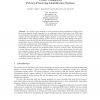Free Online Productivity Tools
i2Speak
i2Symbol
i2OCR
iTex2Img
iWeb2Print
iWeb2Shot
i2Type
iPdf2Split
iPdf2Merge
i2Bopomofo
i2Arabic
i2Style
i2Image
i2PDF
iLatex2Rtf
Sci2ools
110
click to vote
CCS
2007
ACM
2007
ACM
Covert channels in privacy-preserving identification systems
We examine covert channels in privacy-enhanced mobile identification devices where the devices uniquely identify themselves to an authorized verifier. Such devices (e.g. RFID tags) are increasingly commonplace in hospitals and many other environments. For privacy, the device outputs used for identification should "appear random" to any entity other than the verifier, and should not allow physical tracking of device bearers. Worryingly, there already exist privacy breaches for some devices [28] that allow adversaries to physically track users. Ideally, such devices should allow anyone to publicly determine that the device outputs are covert-channel free (CCF); we say that such devices are CCF-checkable. Our main result shows that there is a fundamental tension between identifier privacy and CCFcheckability; we show that the two properties cannot co-exist in a single system. We also develop a weaker privacy model where a continuous observer can correlate appearances of a given ...
CCS 2007 | Device Outputs | Mobile Identification Devices | Security Privacy | Weaker Privacy Model |
| Added | 12 Aug 2010 |
| Updated | 12 Aug 2010 |
| Type | Conference |
| Year | 2007 |
| Where | CCS |
| Authors | Daniel V. Bailey, Dan Boneh, Eu-Jin Goh, Ari Juels |
Comments (0)

